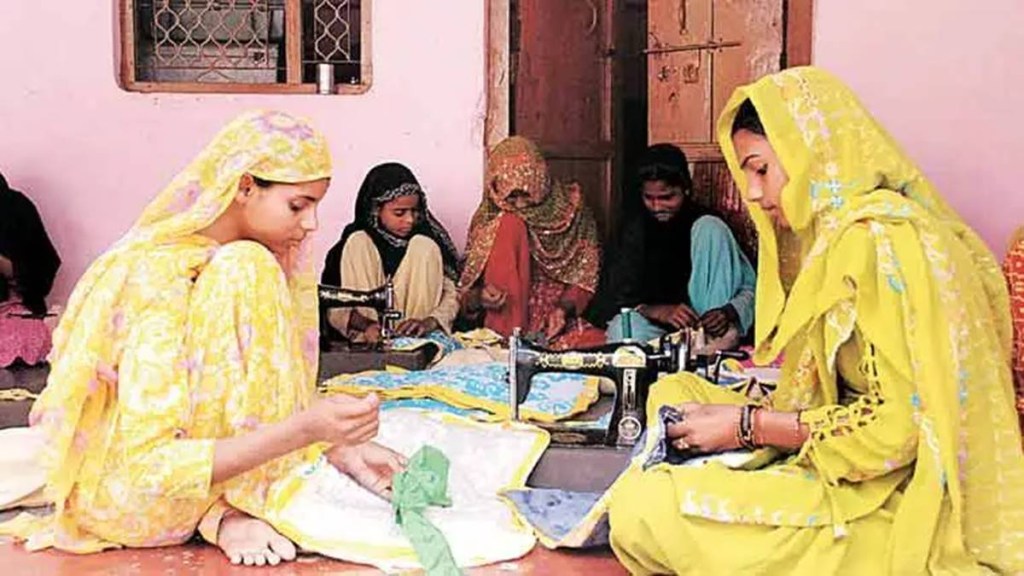By Rajiv Prakash and Uthara Narayanan
Rural India, with its population surpassing 800 million, presents an aspiration-driven market that, if tapped into correctly, could significantly propel economic growth and empower rural women entrepreneurs. The entrepreneurial potential of rural women in India is immense, yet systemic barriers often stifle their participation. With agriculture continuing to be the primary source of employment, diversifying livelihoods through micro-entrepreneurship and non-farm activities, and addressing climate issues by promoting environmental sustainability become even more necessary. Done collectively, it can ensure that efforts contribute positively to both local communities and environmental wellness at a national and global level.
With climate challenges escalating-extreme temperatures, flooding, and drought-reliance on farm-based livelihoods is also becoming increasingly untenable. If rural consumption patterns start to mirror those of urban centers, with long supply chains and high carbon footprints, the ecological costs could be severe, exacerbating issues like nutrition deficits and loss of local production knowledge.
Tackling such a complex problem is the need of the hour, by enabling rural women’s capacities to drive the Indian economy toward sustainability. A 2019 report suggests that by 2030, India could see the rise of 30 million women-led micro, small, and medium enterprises, employing up to 150 million people. This development provides a substantial opportunity for the economic empowerment of rural women, calling for a pivot toward strategies that cater to local needs, championing place-based governance, thereby enhancing community efficiency.
Envisioning a Place-Based Ecosystem with Women Entrepreneurs at its Core
The vision for a Place-Based Ecosystem in rural India centers on the “Produce Local, Consume Local” principle, aiming to transform rural economies by promoting local production for local consumption. Alongside, it is equally necessary to recognize the current ecosystem gaps, turning those into opportunities for entrepreneurial women. Such gaps in marketing, financing, logistics, and production support can in fact present interesting possibilities for women who aspire to be ecosystem players, without relying heavily on governments or CSOs. For instance, in Kolar district, Karnataka, an analysis revealed that the poultry consumption from just 5000 households in a single panchayat could generate revenue of Rs. 180 million annually, illustrating the vast potential of localized production and consumption.
Despite such possibilities, rural women entrepreneurs continue to face multifaceted barriers, ranging from limited access to information, skills, and markets to the complexities of regulatory landscapes and inadequate financing options. Addressing these challenges requires a holistic ecosystem approach, beginning with understanding the factors of business necessary to make such a vision feasible.
Drawing inspiration from the India-stack initiative, the development of a ‘market stack’ specifically designed for rural India can significantly aid in this regard. Such a framework would bolster the rural consumption model and better integrate rural economies into the national economic context, facilitating a more conducive environment for women entrepreneurs to flourish.
By leveraging local resources, and blending traditional knowledge with modern business practices, women entrepreneurs can actually lead the shift towards sustainability, creating both eco-friendly and economically viable models. The creation of women’s cooperatives and enterprises, supported by modern technologies and e-commerce, offers a more decentralized production model and integrates rural economies with larger markets, addressing challenges like climate change as well as contributing to a healthier planet and a robust rural economy.
A practical example of this place-based thinking materializing is seen in Tumkur district of Karnataka, where a group of women have launched a tooth powder business. Investing approximately 3-4 hours daily, they have tapped into a market potential of Rs. 6 million within their panchayat, based on each household spending Rs.100 per month on tooth powder-a common expenditure on dental hygiene. This initiative exemplifies how localized production and consumption can significantly impact rural economies, underscoring the transformative power of women entrepreneurs in these settings.
Championing Women as Change Agents
Fundamentally, rural women’s entrepreneurship requires recognizing women as change agents with innate knowledge and wisdom. Support should extend beyond mere financial considerations to encompass broader life goals, which includes women’s personal growth and overall fulfillment. The barriers women confront are multi-layered and intersecting across social, informational, market, financial and policy realms. Hence, holistic solutions co-created with women themselves are vital.
By dismantling systemic barriers and fostering an ecosystem that amplifies women’s roles as innovators and economic drivers, it is possible to unlock not just economic growth but also social and environmental sustainability. The path forward is clear: invest in rural women’s entrepreneurship, cultivate inclusive support systems, and champion a place-based ecosystem approach. Let this be a collective mission, to turn potential into progress, and in doing so, reshape the landscape of rural India for generations to come.
Rajiv Prakash is an Advisor at The Rainmatter Foundation and Uthara Narayanan is the Co-Founder and Chief Changemaker at Buzz Women. Both the organisations are part of the ClimateRISE Alliance.
Disclaimer: Views expressed are personal and do not reflect the official position or policy of Financial Express Online. Reproducing this content without permission is prohibited.








